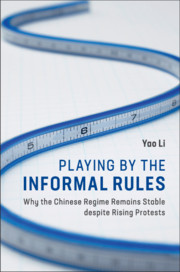Book contents
- Playing by the Informal Rules
- Studies of the Weatherhead East Asian Institute, Columbia University
- Cambridge Studies in Contentious Politics
- Playing by the Informal Rules
- Copyright page
- Dedication
- Contents
- Figures
- Tables
- Acknowledgments
- Abbreviations
- 1 Introduction
- 2 Mapping the Space for Protest
- 3 Accommodating Informal Norms in Regime-Engaging Protests
- 4 Unequal Application of Accommodating Informal Norms
- 5 Antagonistic Informal Norms in Regime-Threatening Protests
- 6 Conclusion
- Book part
- References
- Index
- Series page
4 - Unequal Application of Accommodating Informal Norms
Inequality in Protest Space
Published online by Cambridge University Press: 30 November 2018
- Playing by the Informal Rules
- Studies of the Weatherhead East Asian Institute, Columbia University
- Cambridge Studies in Contentious Politics
- Playing by the Informal Rules
- Copyright page
- Dedication
- Contents
- Figures
- Tables
- Acknowledgments
- Abbreviations
- 1 Introduction
- 2 Mapping the Space for Protest
- 3 Accommodating Informal Norms in Regime-Engaging Protests
- 4 Unequal Application of Accommodating Informal Norms
- 5 Antagonistic Informal Norms in Regime-Threatening Protests
- 6 Conclusion
- Book part
- References
- Index
- Series page
Summary
- Type
- Chapter
- Information
- Playing by the Informal RulesWhy the Chinese Regime Remains Stable despite Rising Protests, pp. 87 - 118Publisher: Cambridge University PressPrint publication year: 2018

